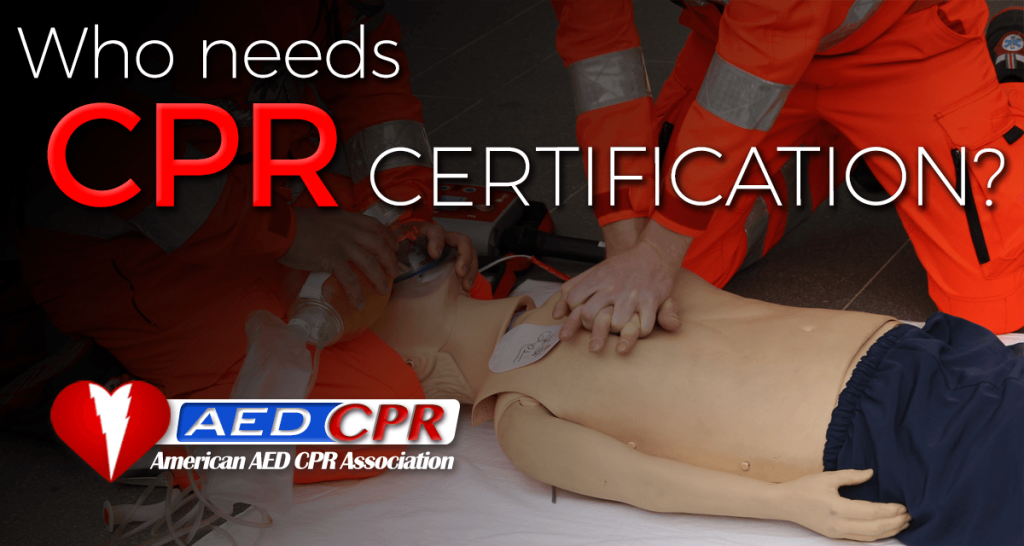
Being able to perform CPR in the event of an emergency is an invaluable skill. Just about everyone can benefit from learning it, but for some of us, having proper CPR training is essential. Having CPR certification is a boon, both personal and professional. There are a number of jobs and careers that require it, even outside of the medical field. Some of them are less obvious than others.
Jobs That Require CPR Training
What jobs require CPR training? It’s a long list, and it’s only getting longer. The requirement for CPR training can be due to government requirements, job licensure or individual employer requirements.
Law Enforcement Officer
As a law enforcement officer, you are often the first to arrive at the scene of an emergency. Handling volatile situations and being prepared for anything is part of the job. This can sometimes include cardiac-related incidents. Callers, suspects and even bystanders could need resuscitation at a moment’s notice. Over the last decade, more and more police departments have been making CPR and AED training mandatory for police officers, with defibrillators becoming standard equipment in many patrol cars.
Childcare Provider
Each state has their own set of licensure requirements for becoming a childcare worker. In addition to undergoing background checks and providing immunization records, you may be expected to meet minimum training requirements in both first aid and CPR. This applies whether you’re working from home, or at a daycare center. Required or no, it’s important that you know how to respond to an emergency situation, especially if you’re one of the only adults around.
Athletic Trainer or Coach
As a fitness industry professional, it’s your responsibility to support your client’s health and wellness goals. Part of that means knowing what to do if they pull a muscle, sprain an ankle, or yes, go into sudden cardiac arrest. Many clients who hire personal trainers in order to get in shape are at a higher risk of cardiac arrest. If worse comes to worst, you need to be able to provide care while waiting for the ambulance to arrive. That’s why some states require fitness professionals to be trained in first aid, CPR and AED administration.
Lifeguard
This one is fairly obvious. Lifeguards supervise swimmers of all ages and physical abilities. Training in CPR, first aid, and AED administration is absolutely mandatory. When you’re at the beach, or a lake, or a public pool, you can’t rely on an ambulance in the event of an emergency. Most of these locations are remote and have large parking lots, which means that outside help could be slow to arrive. If someone needs resuscitation, every second counts, which is why lifeguards need to be properly trained.
Firefighter
Much like police officers, firefighters are often the first responders in emergency situations. Firefighters don’t just put out fires, they also provide immediate care to people affected by them. They are also summoned to the scenes of other incidents that have multiple victims, such as car crashes. Firefighters must be CPR certified in the event that they arrive before the ambulance does.
School Personnel (Teachers, Counselors and More)
Most schools nowadays have at least one onsite defibrillator. In some districts, most if not all school personnel, from teachers to bus drivers, must be CPR and AED certified.
Flight Attendant
It’s impossible to call for trained medical personnel when you’re over 30,000 feet in the air. While planes can usually divert course and make an early landing in the event of a serious emergency, that can take minutes, if not hours depending on the flight. A flight attendant’s basic training often includes first aid and CPR for this reason.
…and More
This list only scratches the surface of non-medical jobs that require CPR certification. We could go on; depending on the employer, the list could also include construction workers, electricians, retail managers, security guards, prison personnel and more.
Medical Jobs That Need CPR Certification
As you might expect, most healthcare professionals must be CPR certified. This includes doctors, nurses, paramedics, dentists, medical technicians, nursing assistants, etc. Basically anybody who works in a doctor’s office or hospital must know how to perform CPR and use the on-site AED.
But is their training the same? The short answer is no. Classes come in different shapes and sizes. After all, it doesn’t make sense for the CPR requirements for nurses to be the same as the CPR requirements for construction workers. The basic requirement for a healthcare professional is the certification called “BLS for Healthcare Providers.” BLS (Basic Life Support) classes are more in-depth and teach you how to respond as a team of professionals. They also teach you how to use equipment, such as bags for oxygen delivery. Essentially, they go above and beyond the basic CPR courses to meet the specific needs of the healthcare industry.
Who Else Needs to Know CPR?
Everyone should learn CPR. The life-saving skills learned in a CPR course go beyond treating cardiac arrest. Parents should take CPR and learn what to do in case of an emergency. Anyone who cares for other people, especially the elderly, should learn CPR.
As we said in the beginning, just about everyone can benefit from learning CPR. Just because the law or your employer doesn’t require you to have CPR certification, that doesn’t mean that you shouldn’t pursue CPR training. The confidence and peace of mind from knowing that you’re ready to help in the event of an emergency is a lot more valuable than a bullet point on your resume.
Learn More About CPR Training
Learning CPR has never been easier. For years, the only way to learn was by spending hours in a classroom. But now, with the advent of online learning, CPR training can be done quickly through an online CPR training class. A typical CPR class covers CPR, rescue breathing, using an AED, and choking. Also covered is how to activate EMS and medical-legal aspects. The important thing is that everyone learns how to save a life. Whether it’s for a job, family member or you just want to learn, get certified today!
FAQ
What jobs can I get with a CPR certification?
A CPR certification will help you qualify for many different jobs. People also often ask what jobs can I get with a First Aid certificate? Having either certification is a valuable asset.
What CPR is required for a nurses?
Nurses are more likely to perform CPR than most other healthcare professionals. The correct CPR course for nurses is the Healthcare Provider BLS class.
What are the CPR requirements for healthcare workers?
Healthcare workers generally require the Healthcare Provider BLS class. To find out the correct class for your position, try our course selection tool.
Do medical assistants need to be CPR certified?
Yes, medical assistants must be CPR certified. Check with your employer to be sure what other certifications are required.
Do doctors need CPR certification?
Yes, all medical doctors need to be CPR certified. The Healthcare Provider BLS course is the correct course for doctors.
What are the CPR requirements for dental offices?
Dental offices generally have individual requirements. Dentists, dental hygienists and dental assistants must all be CPR Certified. However, many dental practices require all office employees to be certified as well.
